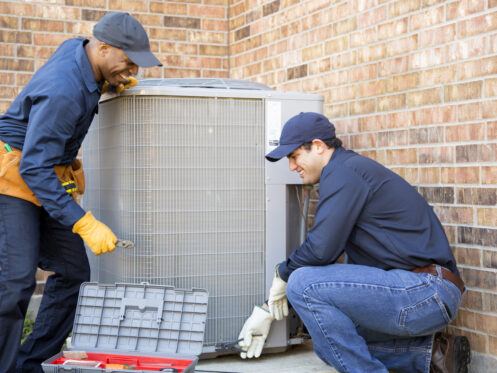It’s surprisingly easy to overlook the HVAC system in your Lincoln, NE home. As thermostats and other heating and cooling equipment become increasingly sophisticated, homeowners enjoy the benefits of self-modulating, self-adjusting technologies that largely care for themselves.
However, all of the HVAC innovations in the world don’t eliminate the need for routine maintenance. Rather than considering the need for service in hindsight, it’s vital to stay on top of the tasks that keep everything running efficiently.
What Is Proactive HVAC System Maintenance?
Proactive HVAC system maintenance is largely comprised of the general maintenance tasks that HVAC equipment manufacturers and installers recommend. It includes regularly inspecting and changing HVAC air filters, scheduling annual tune-up service for heaters and air conditioners, and cleaning accessible components as needed.
To promote efficiency throughout entire HVAC systems, it’s also important to have HVAC air ducts inspected annually, cleaned every two to three years, and replaced every 10 to 15 years. After all, aging, damaged, and dirty air ducts can have more of an impact on the efficiency and performance of heating and cooling equipment than almost any other factor.
Proactive HVAC care puts homeowners in total control of how well their heating and cooling equipment ages, how long it lasts, and how much value it provides overall. It also gives consumers greater control over their indoor air quality (IAQ), their home energy bills, and their comfort. People who proactively maintain their HVAC systems deal with fewer repair issues as well.
What Is Reactive HVAC Care?
Unfortunately, many homeowners only provide reactive care for their HVAC systems. Reactive care is a response to existing, maintenance-related problems that have already taken a turn for the worse. For instance, some people don’t change their HVAC air filters until their heaters and air conditioners are already short-cycling or overheating because of airflow obstructions.
If the air registers, vents, or grilles throughout your home are covered in gray, lint-like debris, you may be guilty of providing reactive care. Even if build-ups of accumulated allergens and contaminants at your air vents are the only symptoms of insufficient maintenance, both the efficiency of your HVAC system and your IAQ have already declined. While proactive care puts homeowners in control of their HVAC systems, people who provide reactive care are constantly at the mercy of their heaters and ACs.
Annual tune-up service for boilers, furnaces, heat pumps, and air conditioners gives HVAC technicians the chance to spot and repair a host of issues. During these visits, we replace damaged and worn components, tighten loose connections, test safety features, and calibrate thermostats among many other things. Without of the insight that these services supply, homeowners could be facing issues with their heating and cooling systems without even knowing it.
Proactive Maintenance Preserves Equipment Manufacturer Warranties
All new heaters, heat pumps, and air conditioners come with manufacturer warranties. These agreements typically last between three and five years, and they cover all repair and replacement costs that result from either substandard manufacturing or defective parts. If you have a relatively new AC or furnace breakdown, you can rely on your manufacturer’s warranty to minimize your out-of-pocket spending.
However, product manufacturer warranties are mutually binding agreements. In addition to making guarantees to consumers, product manufacturers also issue requirements to protect themselves. Performing diligent equipment maintenance is foremost among the requirements of a system warranty. After all, properly maintained equipment is far less likely to malfunction or fail than equipment that’s regularly neglected or only reactively maintained.
If you’re only replacing air filters when accumulated dirt causes overheating, you’re in violation of your heater or air conditioner’s warranty. If you aren’t scheduling professional maintenance service once each year, this agreement could become null and void. You also stand to lose the HVAC system protections that are provided by your home insurance plan and your home service agreement.
Proactive Maintenance Promotes Safety
Of all the things that you might ignore in your home, fuel-combusting and exhaust-producing appliances are easily the most dangerous. Proactive HVAC maintenance doesn’t just save people money and ensure reliable performance. It also keeps building residents safe. Regular exhaust system inspections ensure that carbon monoxide (CO) and other deadly exhaust gases are routed outside. Annual maintenance services also limit the likelihood of electrical malfunctions that could lead to electrocution or electrical fires.
Reactive HVAC Maintenance Has a Negative Impact on Your IAQ
Among the biggest differences between proactive and reactive HVAC maintenance are the vastly different effects that they have on your IAQ. Proactively maintaining your heater and air conditioner limits the amount of allergens, contaminants, and pathogens that are floating around your home. It also ensures effective HVAC humidity regulation. This keeps homes from feeling muggy, hot, and sticky, and greatly reduces the risk of mold and mildew development. As such, proactive maintenance can:
- Protect your home from moisture damage
- Prevent or eliminate unpleasant HVAC odors
- Make your living environment more comfortable
Proactive care is absolutely essential in homes with residents who suffer from chronic obstructive pulmonary disease (COPD), allergies, asthma, or other respiratory conditions. It’s also essential for protecting the health and well-being of infants, age-in-place seniors, and those who are immuno-compromised or living with terminal illnesses.
Reactive Maintenance Costs More
People who perform proactive HVAC system maintenance often do so to save money. Replacing dirty HVAC air filters and scheduling annual maintenance service might not be your top financial priority. However, they’ll definitely save you money in the long run. Regular maintenance services allow HVAC companies to catch and resolve minor or still-developing problems before they’ve impacted other HVAC features and functions. With fewer general and urgent repairs, lower home energy bills, and longer equipment lifespans, you can easily recoup most of the money that you spend on proactive HVAC care.
Preventative Maintenance Plans for Proactive HVAC Maintenance
Preventative maintenance plans establish a strong foundation for proactive HVAC maintenance. These agreements typically provide two or more covered service visits each year so that furnaces and air conditioners can get the annual attention that they require. They also usually include priority scheduling for repairs, generous discounts on service, and other financial benefits and rewards. For a low up-front price or monthly charge, you can make the costs of properly maintaining your HVAC equipment far more manageable.
Are You Being Proactive Enough?
It’s important to note that for some households, scheduling annual HVAC maintenance and regularly changing HVAC air filters may not be enough. In households with ongoing IAQ concerns, excess or insufficient humidity, and poor overall ventilation, additional measures may be required. In these instances, the use of integrated HVAC system accessories such as whole-house dehumidifiers or humidifiers, whole-house air filters, and advanced options in mechanical ventilation give homeowners the greatest control over their spending, health, and comfort.
For more than 20 years, we’ve been proudly serving Lincoln, NE, with cooling, plumbing, electrical, and HVAC services. We also offer geothermal systems, duct cleaning, and UV air sanitizers. To find out about our HVAC preventative maintenance plans or schedule an appointment, contact John Henry's Plumbing, Heating, Air, and Electrical today.

